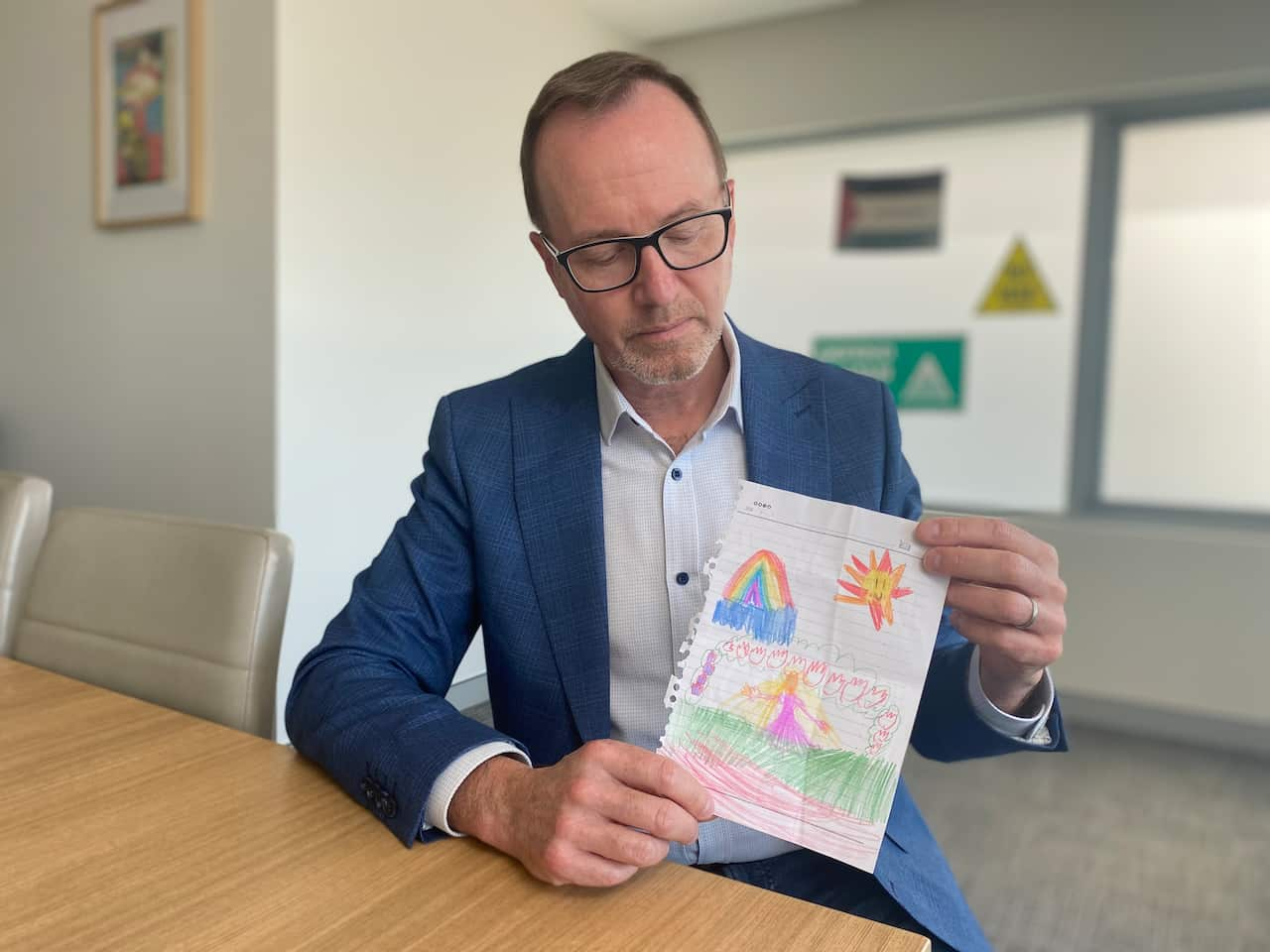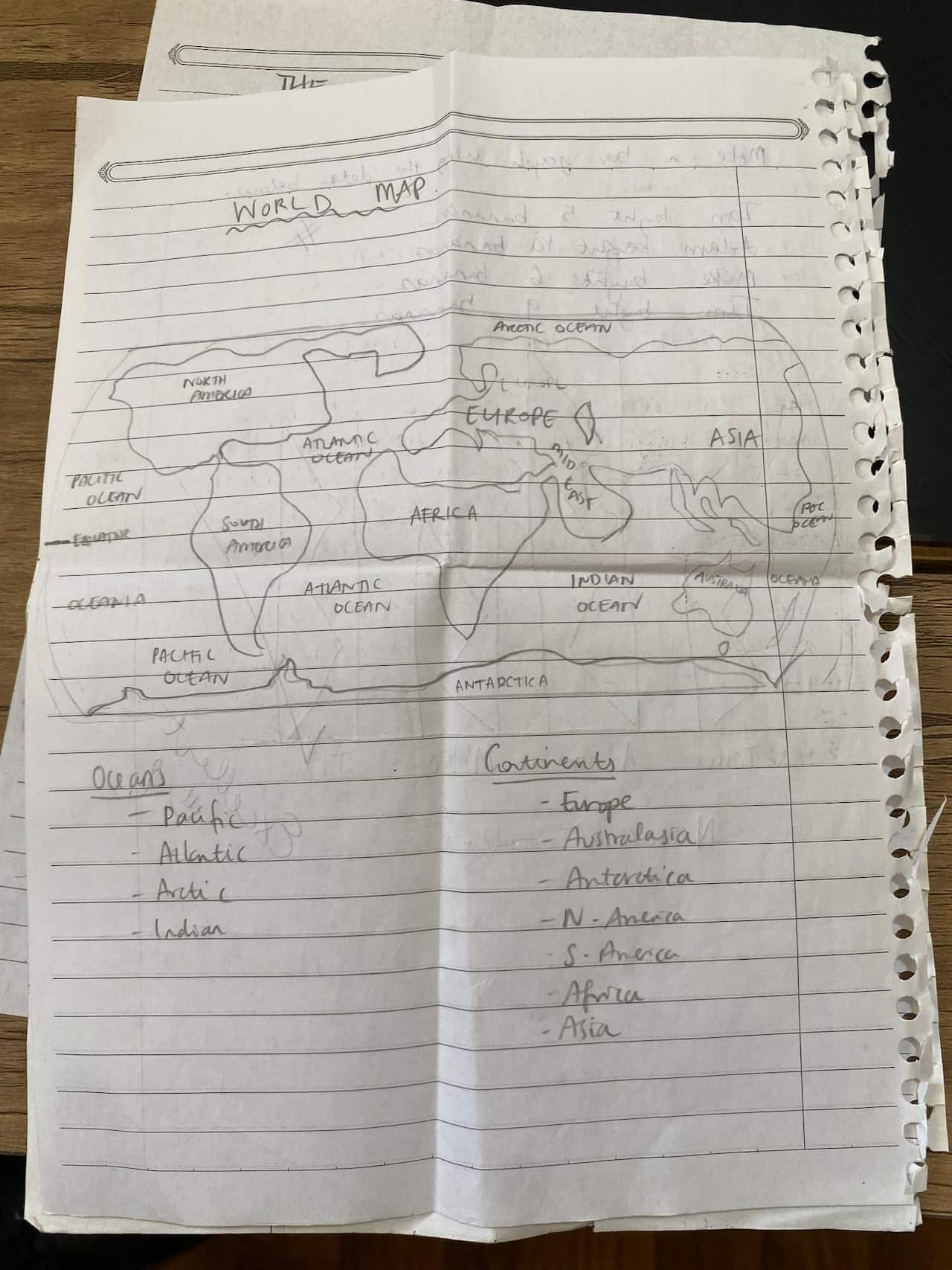A drawing of 'Rapunzel' surrounded by blue skies and roses is how six-year-old Yara imagines life in Australia.
Yara, whose name SBS has changed, has spent her entire childhood in al-Roj detention camp in northeast Syria and has never smelled flowers.
"It was heartbreaking," says Greens senator David Shoebridge, who was given the drawing while visiting the "high security desert prison" in September.
"To think of a little six-year-old Australian girl whose only experience was a tent, a tiny patchwork of dusty streets … and a school that was too ill-equipped to teach her, it was genuinely heartbreaking," he said.
Al-Roj is home to more than 2,500 women and children. The women are often referred to as 'ISIS brides', given their perceived or real links to fighters of the self-proclaimed Islamic State (IS) group.
The camp currently houses 37 Australian citizens, including 25 children.

Since the IS group was toppled in 2019, Australia has conducted two successful repatriation missions.
The Morrison government brought back eight orphaned children in June 2019, while the Albanese government repatriated four women and 13 children in October 2022.
"There is an overwhelming obligation on the Australian government to keep Australian children safe," Shoebridge told SBS.
"I would challenge anybody to explain why an Australian kid shouldn't be given a chance to be safe in Australia … and obviously, if you bring the children home, you can't bring them home without their mums."
'Lack of political will'
On Friday, six women and children arrived back in Australia after smuggling themselves out of Syria's violent al-Hol detention camp via Lebanon.
Opposition leader Sussan Ley said she was "gravely concerned" by the news, which came weeks after the Albanese government denied reports of a secret government plan to repatriate Australians from Syria.
"This is a highly dangerous cohort of individuals who associated themselves with the barbaric Islamic State regime," Ley said.
"The Albanese Labor government must come clean: either they knew about this cohort returning and hid it from the Australian public, or worse, family members of Islamic State terrorists returned to Australia without the government's knowledge."
A Home Affairs spokesperson denied any involvement, stating "the Australian government is not providing assistance and is not repatriating individuals in Syrian IDP [internally displaced people] camps."
"If any of those people find their own way to return, our security agencies are satisfied that they are prepared and will be able to act in the interests of community safety."
"Our agencies have been monitoring these individuals for some time. We have confidence in our agencies."
As the women and children are Australian citizens, they cannot be prevented from returning to Australia.
Shoebridge said the Australian women he spoke to in al-Roj last heard from Australian authorities at the end of 2022, when the Department of Foreign Affairs and Trade (DFAT) collected their passport biodata and photos.
ASIO would not comment on the cohort's current security status.
For chief executive of Save the Children Australia Mat Tinkler, the latest developments simply emphasise the "lack of political will" to repatriate Australians.
"As Senator Shoebridge's recent visit to Syria shows, there are no real obstacles stopping the federal government from repatriating those still trapped in Roj camp," he said.
"There is only a lack of political will getting in the way."
'Absolutely' possible to bring children home
The government has consistently described the security situation in Syria as "increasingly unstable" and said it continues to advise Australians not to travel there.
"Our ability to provide consular assistance to Australians in Syria is extremely limited due to the dangerous security situation," a spokesperson said.
While acknowledging the risks present, Shoebridge said it was "absolutely in the capacity of the Commonwealth government to … safely bring Australian children home".
"I was able to do this [travel to al-Roj] as a senator," said Shoebridge, who visited in his capacity as a parliamentarian.
"The administration in northeast Syria is very open to providing secure escorts and assistance for your visit."

The northeastern part of Syria, where al-Roj camp sits, is de facto administered by the Autonomous Administration of North and East Syria (AANES) led by Syrian Kurds, which is not internationally recognised.
"The Australian government, the US government, worked very closely with those groups during the Syrian Civil War to defeat extremism," Shoebridge said.
"These are really long-standing friends of Australia, so it's hard to explain why our government can't make the obvious approaches and work with the administration there to bring Australian children home."
The US government has for years been urging nations to repatriate their citizens as part of the final dismantling of the IS group.
Amnesty International has also called on governments to do this with urgency, claiming the Trump administration's recent cuts to USAID have plunged al-Roj into "chaos" and "weakened basic services in the camps".
Security advice heightened, then removed
Shoebridge said his trip required three months of intensive planning and coordination with non-governmental organisations, authorities in northeast Syria, community connections and DFAT.
However, he added that, "out of all of those engagements, by far and away, the most difficult was our engagement with our own government."
On the day his delegation crossed the border into Syria, the government amended its Smartraveller website to specifically reference "reporting indicating an ongoing and persistent threat in northeastern Syria".
"We asked to get details about what the risk was. They wouldn't provide it to us," Shoebridge said.
Asked if he believed the government was deliberately trying to prevent his visit to al-Roj, Shoebridge said: "It's very hard to explain."
"It's difficult to know on what basis the Australian government ramped up the security advice the day before we entered, and then we've removed the same security advice the day after," Shoebridge said.
In response to SBS questions, a DFAT spokesperson said the department "keeps all Smartraveller travel advisories under close review, including regularly and carefully assessing the risks to Australians overseas to ensure that we provide accurate and up-to-date information".
'Growing sense of urgency'
For family advocates and politicians alike, there is a growing sense of urgency to repatriate Australians – especially for male children who risk being taken into Syria's adult prison system.
That is precisely what happened to Yusuf Zahab, who was locked up without charge from when he was 15 years old and became emblematic of the large cohort of boys stuck in the prisons of northeast Syria.
"For years we have been urging the Australian government to safely repatriate the Australian children and their mothers trapped in camps in northeast Syria," Tinkler said.
"Save the Children is deeply concerned for the safety of these innocent children, and the longer they stay there, the more danger they face."
Shoebridge said the women he spoke to were particularly concerned about their sons.
"As boys get older and turn 13, 14, and 15, there is a real risk that unless Australia acts soon, those young Australian boys… will be taken [to a men's prison] and literally disappear from sight."
"The fact that political risk is put before keeping Australian kids safe. I just find it unconscionable."
SBS contacted Home Affairs and Immigration Minister Tony Burke with specific questions but did not get a response.
A government spokesperson said: "Our travel advice continues to advise Australians do not travel to Syria due to the dangerous security situation and threat of armed conflict, airstrikes, terrorism, arbitrary detention and kidnapping — as it has been since these Australians travelled there."
For the latest from SBS News, download our app and subscribe to our newsletter.

